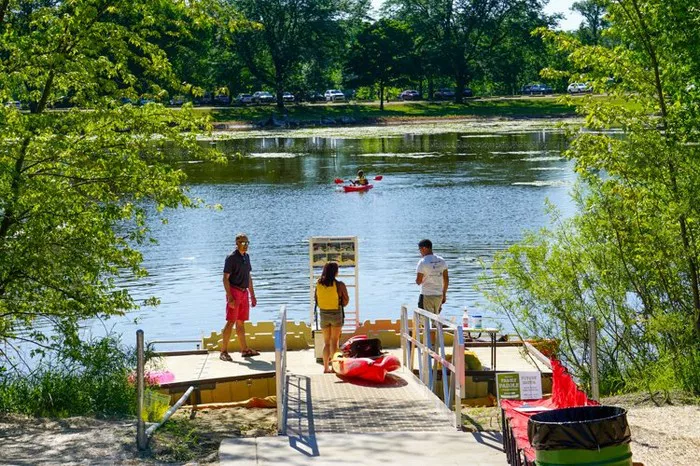West Michigan’s outdoor recreation scene is undergoing a fundamental transformation as the region adapts to climate change. Milder winters and erratic seasonal patterns have prompted shifts in both how residents engage with nature and how local organizations provide access to the outdoors. Reflecting this change, the U.S. Department of Agriculture officially reclassified the area from Climate Zone 5 to Zone 6A in November 2023, marking a significant milestone in the region’s environmental evolution.
This reclassification is not being treated as a setback. Instead, businesses and public entities that have historically depended on cold winters and snowfall are embracing innovative strategies to thrive in longer warm seasons. At Cannonsburg Ski Resort, a traditional winter haven, adaptation has become central to its mission. Marketing director Danielle Musto shared that the resort has long worked to offer more than skiing, developing programs like mountain biking, trail running, and an Adventure Camp for children, all aimed at fostering outdoor engagement throughout the year.
Despite the unpredictable snowfall, Cannonsburg continues to prioritize winter sports while making strategic investments to ensure consistency. Musto explained that revenue from favorable winters is reinvested into snow-making capabilities, allowing the resort to take advantage of cold spells and maintain a high-quality skiing experience. This approach is widely used across Michigan ski resorts and helps them remain viable during shorter and warmer winters.
Cannonsburg’s evolution goes beyond winter expansion; it’s about creating robust year-round offerings. The resort’s Adventure Camp gives kids a chance to reconnect with nature through hiking, team-building, and creative activities. Musto noted that the goal is to get children off screens and into the outdoors, promoting both wellness and environmental awareness.
Looking to the future, Cannonsburg plans to enhance community engagement with new events, including a six-week Pop-Up Disc Golf series beginning Friday nights in August 2025. Sponsored by Great Lakes Disc Golf and Blackrocks Brewery, the series reflects rising interest in the sport, especially as warmer winters create extended seasons for such activities. Additionally, the resort is expanding its social offerings with Taco Tuesdays and venue rentals, and there are aspirations to install a permanent stage for concerts and cultural events. Musto expressed a desire to revive experiences like the Grand Rapids Symphony’s Picnic Pops, which began at Cannonsburg in 1995 and became a local favorite until its cancellation in 2020 due to the pandemic.
Grand Rapids is also adapting its approach to public recreation. David Marquardt, director of Grand Rapids Parks and Recreation, highlighted the city’s strategic partnerships and donor support that are helping bridge the gap left by shifting seasons. One notable initiative is the Thrive Outside Gear Library, supported by contributions from local businesses like Bill & Paul’s Sporthaus and Wolverine Worldwide. This program provides equipment for activities such as hiking, biking, and kayaking, ensuring access to nature for all community members, especially youth.
Marquardt cited the eighth-grade paddling experience program as a major success, offering over 1,000 Grand Rapids Public School students the chance to kayak on the Grand River, often for the first time. The Gear Library’s collection also includes donated bikes that local students repair, creating both learning opportunities and affordable equipment for the community.
In response to warmer weather and growing recreational demand, the city is expanding its trail networks and working to connect them to regional systems. This strategy not only promotes exploration but also supports year-round outdoor activity. Investments in riverfront parks aim to increase public access and provide additional free paddling programs, particularly during the extended warm seasons.
However, climate change brings new challenges. One concern is the rising need for tick prevention, a consequence of longer, warmer months. Richmond Park in Grand Rapids has been particularly affected by these shifts; its once-popular ice skating rink has disappeared due to insufficient cold weather. Marquardt pointed to historical images in the book Stay on the Grass, which show the park’s pond filled with skaters—an activity that is now impossible under current climate conditions.
Retailers are also pivoting in response to these environmental trends. Bill & Paul’s Sporthaus, long known for its winter gear, has seen a decline in demand for items like cross-country skis and winter boots. According to Jon Holmes, the store’s marketing and e-commerce director, customers are now seeking hiking shoes, day packs, and clothing with UV protection or moisture-wicking properties. These shifts indicate how consumer behavior is mirroring the changing climate.
West Michigan’s response to these environmental challenges is grounded in adaptability and innovation. With proactive efforts from both private and public sectors, the region is not only preserving outdoor recreation but expanding its possibilities. As Holmes aptly put it, people are still enjoying the outdoors—just in different ways.
Related Topics
- Savanna Shines as Premier Destination for Outdoor Enthusiasts and Small-Town Charm
- West Bexington Residents Raise Concerns Over Increasing Wild Camping and Antisocial Behavior
- Former Forest Service Worker Warns Federal Staff Cuts Threaten Safety of Outdoor Recreation in Colorado

